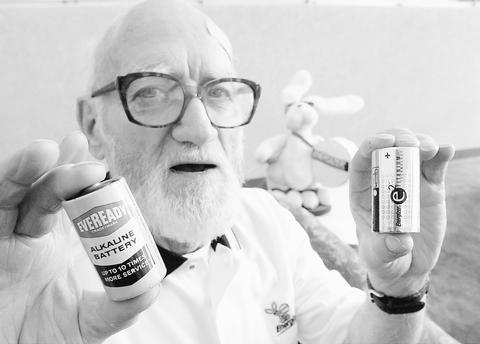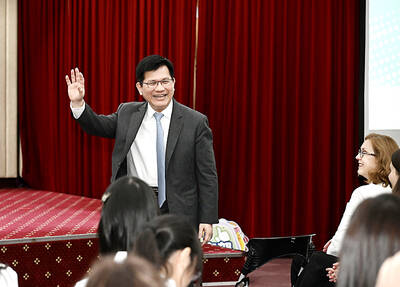Batteries, the technology that time forgot, should have disappeared alongside 8-track tapes.
The sealed chemical cocktails we use to power computers, boom boxes and mobile phones are little changed since the 1950s.
For decades, electronics designers have struggled to tailor the latest concoction in silicon chips and integrated circuits to the power limitations of the lowly battery.

PHOTO: AP
"They're holding us back big time," said Paul Saffo, director of the Institute for the Future. Had batteries advanced at the pace of the computer processor, "a double-A cell would contain more energy than a tactical nuke."
Other than a few devices like weak solar cells and mechanical cranking devices, there isn't an alternate portable power source. Batteries are it.
"There's not much you can do about it," said Boris Donskoy, who designs portable electronic instruments for InHand Electronics Inc, of Rockville, Maryland "There are basic limitations in physics."
Researchers talk of batteries being replaced at some point by portable fuel cells and tiny jet engines -- or a new battery made of a better combination of chemicals. But no one can say when.
Until then, we're stuck with a power source whose origins date to 1859, when the first lead acid battery was made in France.
The same basic energy storage concept still fuels the four billion disposable batteries sold each year in the US. And vestiges of bygone days infuse the industry vernacular.
The name of No. 3 US battery seller Rayovac Corp dates to the 1930s, when radio technology got a boost from the onset of vacuum tubes -- an anachronistic technology replaced long ago by the transistor.
Rayovac engineer Jim Pilarzyk said his industry has no hope of keeping up with fast-morphing computer processors, which double in speed and halve in size every 18 months.
A 5 percent improvement in power capacity every two years is about the best battery scientists can manage, he said.
"The battery industry is somewhat limited," Pilarzyk said. "They're analog devices in a digital world."
For all their shortcomings, comparing batteries with computers isn't fair.
Batteries' roots lie in chemists' beakers. Computer speed is pushed by advances in manufacturing, and the ability to make circuits and transistors smaller and smaller.
"A battery isn't a microprocessor," said Professor Donald Sadoway, a battery researcher at the Massachusetts Institute of Technology. "It's a chemical device. It observes different scaling laws."
For designers of portable electronics, who yearn to shrink their gadgets and add gobs of features, battery power is the choke point that stunts their ambitions.
"The last 20 years have been aimed at designing around the limitations of batteries," Saffo said.
If the device needs to be small, it won't run long. If it needs to run long, it can't be small -- or have power-guzzling add-ons like a fast processor, DVD drive, audio or a color display.
"When I want to design something, my first question is, `How much power does it consume?' There's a big trade-off between size, power consumption and cost," Donskoy said.
The thirst for portable power is relentless. As soon as a better battery emerges, designers quickly respond with new gadgets that push the cells to their furthest limits.
In the early 1990s, laptop computers were made possible by rechargeable nickel metal hydride and nickel cadmium batteries, which gave portables an operating life of four hours or so.
When more powerful lithium ion batteries emerged in the late 1990s, the breakthrough allowed cell phones to shrink to shirt-pocket size. Lithium cells fueled the release of handheld computers, which could run for several hours and even sport backlit color screens.
Since then, battery science has reached a plateau, scientists say.
"We're starting to approach the engineering limits of that chemistry," Sadoway said, referring to the lithium ion cell.
Another problem with batteries is environmental. Of the billions sold each year, most wind up in landfills and incinerators, where their toxic contents -- mercury, cadmium, zinc, nickel and manganese among them -- leach into groundwater and air, said Allen Hershkowitz of the National Resources Defense Council.
While chemists and engineers struggle to eke out a little more power -- giving batteries thinner skins, a less inert material -- consumers locked into buying and discarding batteries wonder whether there's a conspiracy. Do manufacturers refuse to make a better battery?
"It's not economic for battery manufacturers to develop new technology," said Bruce Rittenhouse, president of Electronic Automation Inc, a Grand Rapids, Michigan company that repairs industrial electronics. "Why do it? They want to sell you batteries every month, not every six years."
Lew Urry, a scientist with Energizer Holdings Inc, pshaws the notion. With Energizer and its archrival Duracell leapfrogging each other, a slowdown in innovation gives the other company powerful boasting rights.
"You can't afford to let that happen," said Urry, 76, who helped invent Eveready's first alkaline battery, which hit store shelves in 1958.
Before then, weaker lead acid batteries were important to still unelectrified farmhouses in rural North America, powering flashlights and radios.
In 1958, it wasn't portable computers that were made possible by Urry's alkaline battery, but a flood of battery-powered toys.
In a Cleveland plant owned by Union Carbide -- the former corporate parent of Eveready and Energizer -- Urry gave an early demonstration of an alkaline battery by letting a toy car zip around the cafeteria floor.
Batteries, which have long been derided for polluting the environment, will soon do their part to clean it up, MIT's Sadoway said.
The same research that is shrinking cell phones has a higher purpose: an exhaust-free electric car.
"I didn't get into batteries because I wanted to help some guy yak longer on his cell phone," Sadoway said.
Within a handful of years, batteries will be powerful and cheap enough to propel a car 400km without a recharge. When this happens, automakers will junk the internal combustion engine, Sadoway predicted. Except for the battery, the clean car is ready to roll, he said.
"If this battery existed and I had the patent, I'd be lying next to a kidney shaped pool with the sun on my back right now," he said.

FIREPOWER: On top of the torpedoes, the military would procure Kestrel II anti-tank weapons systems to replace aging license-produced M72 LAW launchers Taiwan is to receive US-made Mark 48 torpedoes and training simulators over the next three years, following delays that hampered the navy’s operational readiness, the Ministry of National Defense’s latest budget proposal showed. The navy next year would acquire four training simulator systems for the torpedoes and take receipt of 14 torpedoes in 2027 and 10 torpedoes in 2028, the ministry said in its budget for the next fiscal year. The torpedoes would almost certainly be utilized in the navy’s two upgraded Chien Lung-class submarines and the indigenously developed Hai Kun, should the attack sub successfully reach operational status. US President Donald Trump

Taiwan Semiconductor Manufacturing Co (TSMC, 台積電) is expected to start construction of its 1.4-nanometer chip manufacturing facilities at the Central Taiwan Science Park (CTSP, 中部科學園區) as early as October, the Chinese-language Liberty Times (the Taipei Times’ sister newspaper) reported yesterday, citing the park administration. TSMC acquired land for the second phase of the park’s expansion in Taichung in June. Large cement, construction and facility engineering companies in central Taiwan have reportedly been receiving bids for TSMC-related projects, the report said. Supply-chain firms estimated that the business opportunities for engineering, equipment and materials supply, and back-end packaging and testing could reach as high as

ALL QUIET: The Philippine foreign secretary told senators she would not respond to questions about whether Lin Chia-lung was in the country The Ministry of Foreign Affairs on Wednesday confirmed that a business delegation is visiting the Philippines, but declined to say whether Minister of Foreign Affairs Lin Chia-lung (林佳龍) is part of the group, as Philippine lawmakers raised questions over Lin’s reported visit. The group is being led by Deputy Minister of Agriculture Huang Chao-chin (黃昭欽), Chinese International Economic Cooperation Association (CIECA) chairman Joseph Lyu (呂桔誠) and US-Taiwan Business Council (USTBC) vice president Lotta Danielsson, the ministry said in a statement. However, sources speaking on condition of anonymity said that Lin is leading the delegation of 70 people. Filinvest New Clark City Innovation Park

TPP RALLY: The clashes occurred near the Chiang Kai-shek Memorial Hall on Saturday at a rally to mark the anniversary of a raid on former TPP chairman Ko Wen-je People who clashed with police at a Taiwan People’s Party (TPP) rally in Taipei on Saturday would be referred to prosecutors for investigation, said the Ministry of the Interior, which oversees the National Police Agency. Taipei police had collected evidence of obstruction of public officials and coercion by “disorderly” demonstrators, as well as contraventions of the Assembly and Parade Act (集會遊行法), the ministry said in a statement on Sunday. It added that amid the “severe pushing and jostling” by some demonstrators, eight police officers were injured, including one who was sent to hospital after losing consciousness, allegedly due to heat stroke. The Taipei